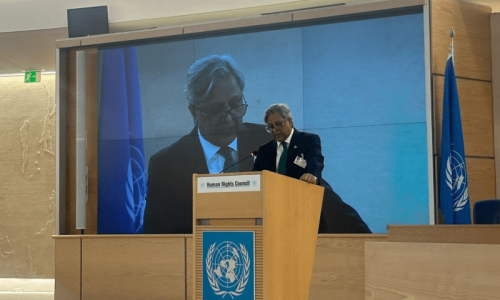MEDEA Benjamin, co-founder of the anti-war group CodePink, recently said: “We want to publicly join the Pakistani call for an end to the drone strikes, and insist that our government apologise and compensate the families of innocent victims.
“We travel as ‘citizen diplomats’, modeling a relationship of respect and reverence for life that we would like our government to adopt.”
Benjamin is part of a delegation of American peace activists protesting drone attacks and that was scheduled to join a peace march — permission for which has been denied by the local administration — to South Waziristan in collaboration with the Pakistan Tehrik-i-Insaaf on Oct 7.
The American activists have been at the forefront of attempting to change the narrative on drone attacks in Pakistan among the American public.
It has been an uphill task. As a Washington Post poll from February this year noted, 83 per cent of Americans were in favour of using drones against “terrorist suspects overseas”.
Their position is supported by their ignorance: few Americans know anything about drones, the protocol followed in operating them, or the tactics used to select targets.
With the American economy and an unpromising job market dominating the headlines in the run-up to the US presidential election, most Americans seem content to leave the dirty, complicated business of rounding up terrorists to remote-control warfare without taking the trouble to demand accountability for the killing being done in their name.
Groups like CodePink and Veterans for Peace have tried to disturb this inertia. On Sept 27, 2012 Veterans for Peace conducted a simultaneous protest outside the San Diego manufacturing plants of General Atomics, the manufacturer of Reaper unmanned aerial vehicles used by the American and British militaries.
Reaper drones have been used to target and kill in Yemen, Afghanistan and Pakistan.
Following the protest, which also took place in the London plant of the company, Veterans for Peace is collecting signatures protesting drone attacks in Pakistan that they plan to deliver to the UN secretary general, chief prosecutor of the International Criminal Court, President Obama and US Secretary of State Hillary Clinton.
The intentions of these activists are clear; they see drone attacks as an invasion of Pakistan’s sovereignty, decry the civilian loss of life in the name of security for Americans and want to show Pakistanis that not all Americans share the self-serving view of US policymakers adept at using legal loopholes to accomplish short-sighted goals.
In Pakistan, however, their good intentions are likely to be challenged. As a recent poll done by the Pew Foundation demonstrates, Pakistan has the highest level of anti-American sentiment — 74 per cent of Pakistanis see the US as an enemy.
Pakistanis don’t need to look at these polls to know this; the raging mobs and rampant destruction following the protests against an anti-Islam video originating in the US barely a fortnight ago demonstrated the sentiment quite adequately.
In the local Pakistani pre-election context, defending Islam and Pakistan neatly equals denouncing America and in its recent most destructive iteration, everything American good or bad is fair game.
It is this last fact, the inability of many in Pakistan to distinguish between the good and bad of American policy or positions, that puts a question mark on whether such a peace march can take place, even if the most well-intentioned of Americans participate in it.
The Pakistani argument against drones is that they are an impingement on Pakistani sovereignty, cause more harm than good and are careless at distinguishing between Pakistani civilians and the terror suspects they are out to catch.
The now forbidden peace march poses the last question to Pakistanis: is it possible to be angry at drones, angry at the imperialist overreach, angry at the myopia of American foreign policy and still retain the reasonableness and empathy to distinguish between good and bad Americans?
As thorny questions go, there are few or no easy answers. If the protests surrounding the disparaging film were disturbing in their ferocity, the rhetoric of denunciation was similarly alarming in its inability to draw a distinction between the film as an act of a cruel provocateur who happens to live in the US and the film as a representation of official American views on Islam or Muslims.
Several Pakistani political figures eager to score election points and ride the anointing waves of anti-Americanism actively encouraged the conflation, and were not at all apologetic about whetting the already boiling rage across the country. Some of those who did so are also vocal against drones and affiliated with the party organising the peace march in Waziristan.
The American peace activists who arrived in Pakistan have come alone, without the security provided to American diplomats, the convoys of armed guards in SUVs that have such tragic associations in the Pakistani mind. They have come without protection to show that they regret and rebel against the position of their government that is unable to see the displacement and destruction it does via remote control in foreign lands.
They have come to a country suspended between logic and illogic. All Pakistanis can agree that the most tragic aspect of the violence surrounding the film protests were the many innocent shopkeepers, themselves devout and without any connection to the film or the US, who lost their businesses, the result of decades of sweat and savings, to the undifferentiating anger of a mob intent on destruction.
It is that suspension of logic and rationality that is Pakistan’s challenge for peace, and that stands between the gesture brought to them by the American peace activists and their ability to respect and value it with the grace of those who can look beyond their own pain.
Such an exchange requires the blurring of the line between enemy and friend. Its most stalwart opponents on either side, American and Pakistani, are the champions of war who wish to keep both Americans and Pakistanis angry and blind.
The writer is an attorney teaching constitutional law and political philosophy.











































